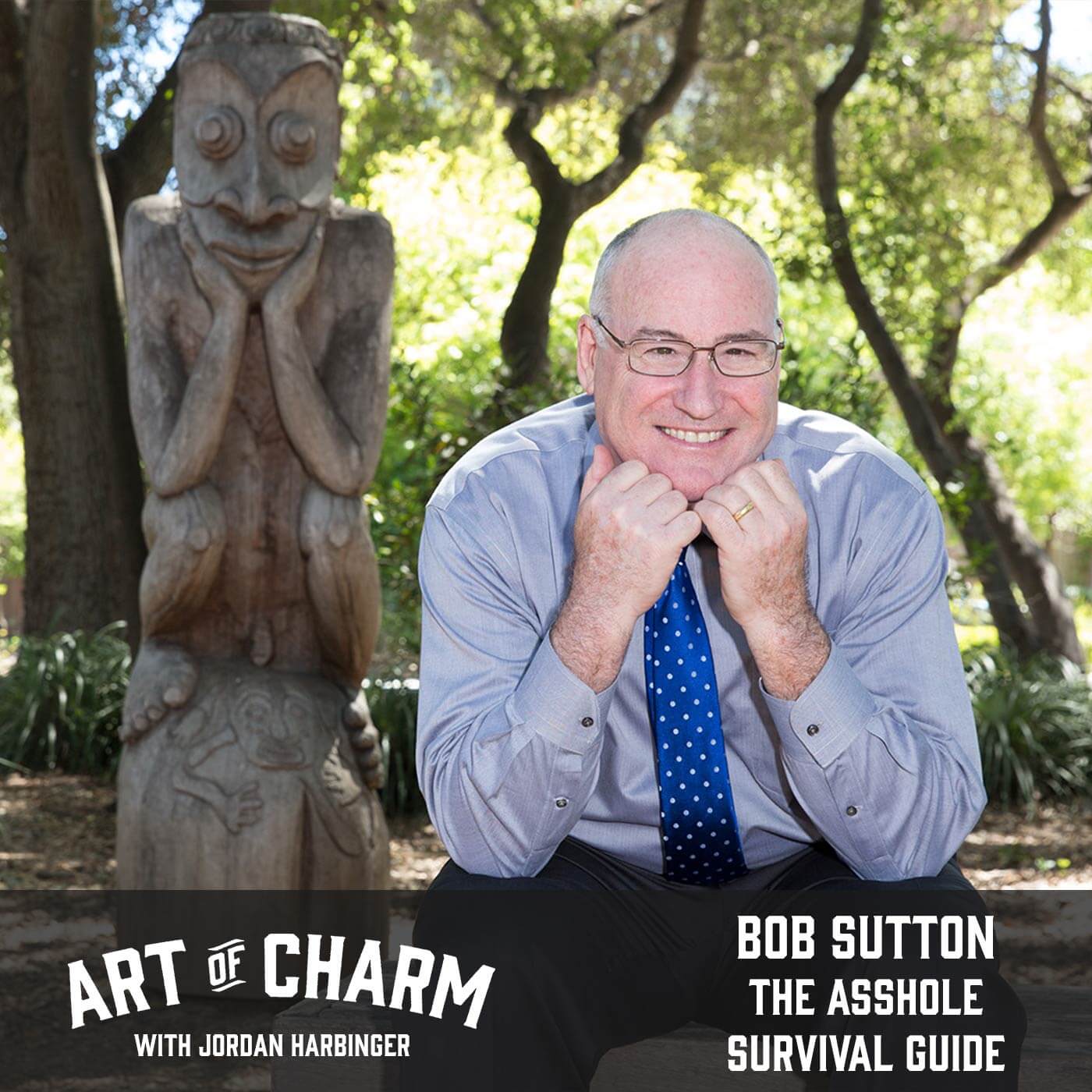Bob Sutton (@work_matters) is a Stanford Business School professor and author of New York Times Bestseller The No Asshole Rule and, most recently, The Asshole Survival Guide: How to Deal with People Who Treat You Like Dirt.
“Be slow to label others as assholes and be quick to label yourself as one.” -Bob Sutton
The Cheat Sheet:
- What is an asshole, and why do they seem to be everywhere?
- Why assholes do not finish first.
- What to do if you’re forced to work with an asshole.
- How to spot the red flags that help you avoid dealing with assholes in the first place — or know when it’s time to quit the assholes who are already in your life.
- How to tell if maybe you’re the asshole.
- And so much more…
[aoc-subscribe]
(Download Transcript Here)
(Download Worksheet Here)
Disrespectful and demeaning people do so much damage to others’ mental and physical health and to the productivity and creativity of others. Tens of thousands of studies shows such effects, and yet many in our culture still believe that these people — let’s call them assholes — finish first.
Today’s guest is Bob Sutton — author of New York Times Bestseller The No Asshole Rule: Building a Civilized Workplace and Surviving One That Isn’t and, most recently, The Asshole Survival Guide: How to Deal with People Who Treat You Like Dirt; he joins the show to help us navigate our way around the assholes in our lives and, perhaps most important, avoid being the assholes others dread. Listen, learn, and enjoy!
More About This Show
How does Bob Sutton — author of New York Times Bestseller The No Asshole Rule: Building a Civilized Workplace and Surviving One That Isn’t and, most recently, The Asshole Survival Guide: How to Deal with People Who Treat You Like Dirt — define an asshole?
“The answer is someone who leaves you feeling demeaned, disrespected, and deenergized,” says Bob. “This definition is important because, if you feel this way, you need to do something to reduce the damage. And at the same time you need to figure out if you are part of the problem. Perhaps you are thin-skinned. Perhaps you are a jerk and people are responding with hostility in kind.”
To be clear, Bob does a lot more with his life than write about dealing with assholes. As a professor at Stanford Business School for the past thirty years, he studies organizational change, leadership, innovation, and workplace dynamics. He’s authored and co-authored plenty of bestselling books on completely non-asshole-related topics. He’s published over 150 articles and chapters in peer-reviewed journals, management outlets such as Harvard Business Review and the McKinsey Quarterly, and news outlets including The New York Times, Financial Times, and Wall Street Journal — and, you guessed it, almost none of them are devoted to the subject of assholes.
But he’s most famous to the mainstream as the guy who writes about assholes. Why? Well, we can all relate to assholes. We’ve gone to school with them. We work with them. Some of us were raised by them. They cut us off in traffic. They wait until they get to the counter to decide what they want to order even though they’ve been in line in front of us for twenty minutes. They’re everywhere. But to paraphrase famous 19th century party animal Friedrich Nietzsche: “Beware that, when fighting assholes, you yourself do not become an asshole…for when you gaze long into the abyss, the abyss gazes also into you.”
Science of the Asshole
Aside from the general annoyance that assholes generate in others, should we just shrug them off as an inevitable part of modern life and suck it up? According to Bob, the science warns against it if we want to live long, healthy, happy, and productive lives.
Bob says: “If you look at the range of research…if you have regular exposure to somebody who leaves you feeling demeaned, disrespected, and deenergized…you’re more prone to anxiety, depression; if you have a boss who treats you like dirt over a long period of time, there’s good studies that show you’re more likely to have heart disease and a heart attack. There’s other studies that show that you’ll have sleep problems.
“Still other studies that show that your relationships will start degenerating with the people in your family and your close friends. So that’s the well-being part…when people treat others like dirt, they’re less productive, they make more errors, they’re less creative, they tend to quit, they’re less willing to go that extra mile. So all sorts of evidence that although sometimes it might help the jerk to get ahead, on the whole, they’re doing all sorts of damage.”
On top of all this, research shows that negative emotions are contagious. That’s right — being treated like assholes turns people into assholes. That’s Nietzsche’s abyss staring right back.
“You will become what’s making you sick!” says Bob.
Decrease Exposure to Assholes
So it’s clear we want to decrease our interactions with assholes for a number of reasons. But where do we begin? By being aware of the prevailing atmosphere when we go into a situation where we could potentially be spending a lot of time.
“When you interview for a job, look at the people at the workplace [where] you’re interviewing…you will become like them; they are not going to become like you. Those forces are very powerful,” says Bob
Listen to this episode of The Art of Charm in its entirety to learn more about how many peer-reviewed academic articles about assholes have been published in the last decade, the different types of assholes, mind tricks that Bob says will “protect your soul,” how using humor and emotional detachment can help you withstand the biggest examples of assholeism that walk the earth, when it’s time to have a conversation with an asshole and when (and how) to fight back, how to use temporal distancing to get through unavoidable encounters with assholes, figuring out what triggers our own assholery, how to avoid being a toxic enabler who empowers assholes, and lots more.
THANKS, BOB SUTTON!
If you enjoyed this session with Bob Sutton, let him know by clicking on the link below and sending him a quick shout out at Twitter:
Click here to thank Bob Sutton at Twitter!
Resources from This Episode:
- Transcript for this episode
- Worksheet for this episode
- The Asshole Survival Guide: How to Deal with People Who Treat You Like Dirt by Robert I. Sutton
- The No Asshole Rule: Building a Civilized Workplace and Surviving One That Isn’t by Robert I. Sutton
- Other books by Bob Sutton
- Bob Sutton’s website
- Friction Podcast
- Bob Sutton at Twitter
- Cloudflare CEO on Terminating Service to Neo-Nazi Site: ‘The Daily Stormer Are Assholes’ by Kate Conger, Gizmodo
- Does Social Exclusion Motivate Interpersonal Reconnection? Resolving the “Porcupine Problem” by Jon K. Maner, C. Nathan DeWall, Roy F. Baumeister, and Mark Schaller
- Bantercast Episode 15: Harvey Weinstein is an Asshole
- Glassdoor
- Wow. The Defense of That Sexist Stanford GSB Video May Be Even More Sexist Than the Video by Sarah Lacy, Pando
- Philz Coffee
You’ll Also Like:
- The Art of Charm Challenge (click here or text AOC to 38470 in the US)
- The Art of Charm Bootcamps
- Elite Human Dynamics
- Best of The Art of Charm Podcast
- The Art of Charm Toolbox
- The Art of Charm Toolbox for Women
- Find out more about the team who makes The Art of Charm podcast here!
- Follow The Art of Charm on social media: Instagram | Twitter | Facebook
On your phone? Click here to write us a well-deserved iTunes review and help us outrank the riffraff!




